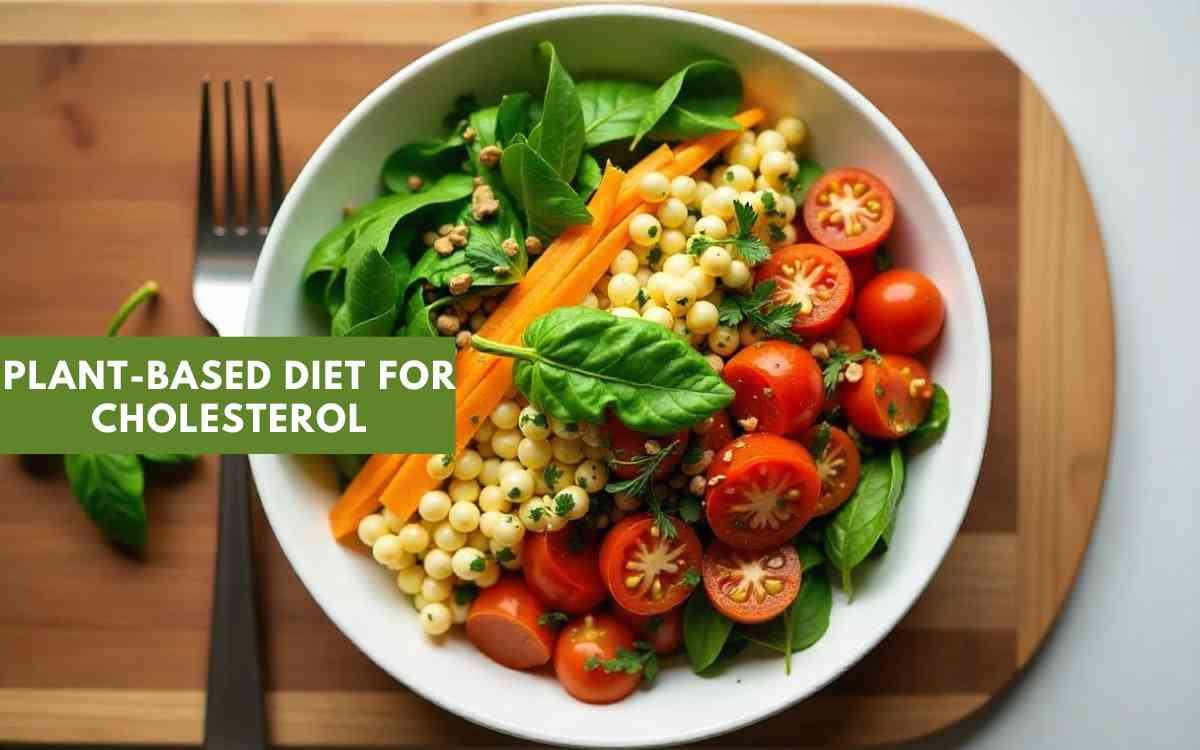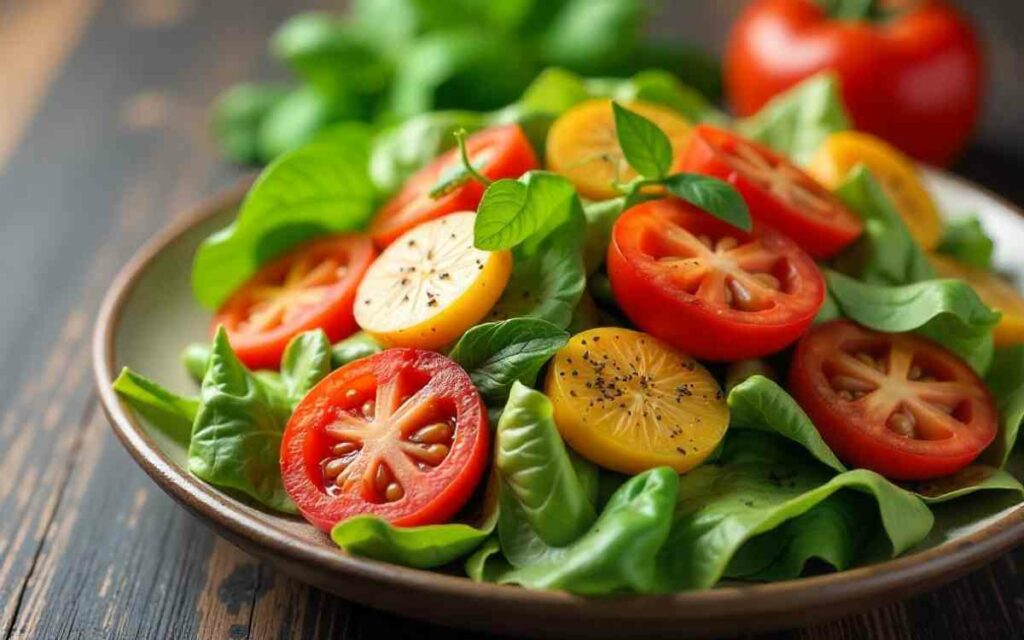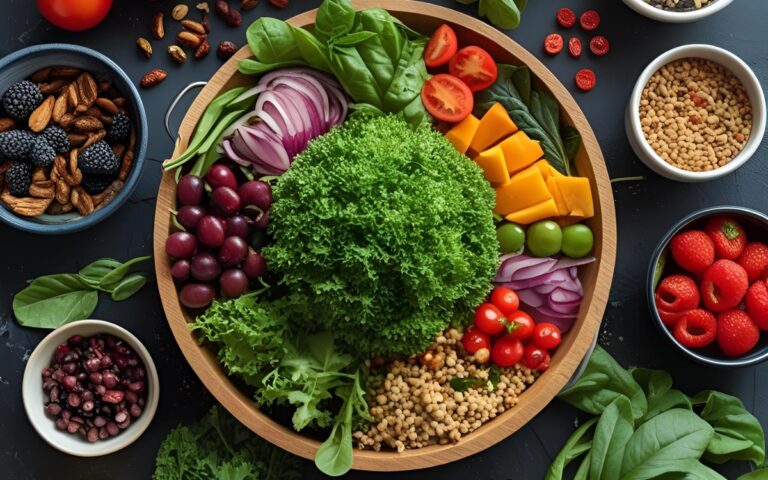Plant-Based Diet for Cholesterol: Unlock Heart Health
A plant-based diet can help lower cholesterol levels. This natural approach benefits heart health and overall well-being.
The rising interest in plant-based diets isn’t just a trend. It’s a proven strategy for many seeking a healthier lifestyle.
By focusing on fruits, vegetables, grains, and legumes, people can reduce harmful cholesterol. This diet limits saturated fats found in animal products.
It replaces them with nutrients and fibers that promote a healthy heart. With heart disease being a leading cause of death, managing cholesterol is crucial.
A plant-based diet offers a practical, sustainable solution. It’s not just about cutting out meat.
It’s about embracing a variety of delicious, nutritious foods. Discover how this diet can transform your health and reduce cholesterol.
Key Takeaways:
Expert Guidance:

Benefits Of Plant-based Diet
Embracing a plant-based diet offers numerous health benefits.
This approach focuses on consuming whole foods derived from plants, including vegetables, fruits, legumes, nuts, and seeds.
Eating more plant-based foods can help manage cholesterol levels and enhance heart health.
Lower Cholesterol Levels
A plant-based diet significantly reduces bad cholesterol levels.
Fiber-rich foods like oats, beans, and fruits absorb cholesterol and help eliminate it from the body.
Plant sterols found in vegetables and nuts block cholesterol absorption.
This dietary choice naturally lowers LDL cholesterol, reducing the risk of heart disease.

Improved Heart Function
Heart function improves with a plant-based diet. Nutrient-rich foods provide essential vitamins that strengthen the heart muscles.
Antioxidants found in fruits and vegetables combat inflammation and support blood vessel health.
Regular consumption of these foods helps maintain healthy blood pressure. The heart works more efficiently.
Key Nutrients In Plant Foods
Plant-based diets help lower cholesterol with key nutrients. These include fiber, healthy fats, and antioxidants.
Vegetables, fruits, nuts, and seeds provide these essential components. They support heart health and overall wellness.
Eating a variety of these foods ensures maximum benefits.
When you’re considering a plant-based diet to manage your cholesterol levels, understanding the key nutrients found in plant foods is crucial.
These nutrients offer a range of benefits that can support heart health and overall wellness.
From fiber to healthy fats, plant foods are a treasure trove of nutrients that can help you take control of your cholesterol levels naturally.

Fiber For Heart Health
Fiber is your heart’s best friend. It helps lower cholesterol levels by binding to cholesterol particles and removing them from your body. Whole grains, fruits, and vegetables are excellent sources of fiber.
Adding a variety of these to your meals can make a significant difference. Imagine starting your day with a bowl of oatmeal topped with berries.
Not only is it delicious, but it’s also packed with fiber that supports heart health. How can you incorporate more fiber into your diet today?
https://gigasecurehome.com/wyze-vs-ring-vs-blink
Healthy Fats And Omega-3
Not all fats are bad for you. Plant-based diets are rich in healthy fats that can improve your cholesterol profile.
Foods like avocados, nuts, and seeds contain monounsaturated and polyunsaturated fats, which are beneficial for heart health.
Did you know that walnuts are a great source of omega-3 fatty acids?
These essential fats can help lower triglycerides and improve cardiovascular health.
Next time you’re reaching for a snack, consider a handful of nuts instead of something processed.
By focusing on these key nutrients, you can make simple yet impactful changes to your diet. What plant-based foods will you add to your meals to boost your heart health?
Top Cholesterol-lowering Foods
Plant-based diets offer a natural way to lower cholesterol. Certain foods are especially effective.
They can dramatically improve your health. These foods are rich in nutrients.
They help maintain healthy cholesterol levels. Explore the top cholesterol-lowering foods.
Each offers unique benefits. Incorporating them is simple. They add flavor and nutrition to meals. Let’s delve into these powerful foods.
Leafy Greens And Cruciferous Vegetables
Leafy greens are rich in fiber. This helps reduce cholesterol levels. Spinach and kale are excellent choices.
They contain compounds that prevent cholesterol absorption. Cruciferous vegetables also lower cholesterol. Broccoli and cauliflower are examples.

They are full of antioxidants. These vegetables support heart health. Eating them regularly is beneficial. They are easy to add to meals.
Nuts And Seeds
Nuts are heart-healthy snacks. Almonds and walnuts are top picks. They contain healthy fats and fiber.
These reduce bad cholesterol levels. Seeds like chia and flax are also effective. They are rich in omega-3 fatty acids.
This aids in lowering cholesterol. Incorporate them into your diet. Sprinkle them on salads or oatmeal. They are versatile and nutritious.
https://gigasecurehome.com/blink-camera-red-light-when-recording
Transitioning To Plant-based Eating
Transitioning to a plant-based diet can improve your cholesterol levels. It involves replacing animal products with plant-based alternatives.
This dietary change can support heart health and overall well-being. Many people find it challenging at first.
But with planning and patience, it becomes easier.
Gradual Dietary Changes
Start with small steps. Introduce more fruits and vegetables into your meals.
Replace red meat with plant proteins like beans and lentils. Swap dairy products with almond or soy milk.
These changes help your body adjust gradually. They also reduce the risk of feeling overwhelmed.
Meal Planning Tips
Plan your meals in advance. This ensures you have all the necessary ingredients.
It also helps avoid last-minute unhealthy choices. Incorporate a variety of foods to get essential nutrients.
Use whole grains, seeds, and nuts for added nutrition.
Creating a weekly menu can simplify this process. Always keep healthy snacks on hand. This prevents the temptation of unhealthy options.
Common Myths And Misconceptions
A plant-based diet is often misunderstood. Many believe it lacks essential nutrients.
Let’s explore some common myths and misconceptions surrounding this diet.
This section will clarify doubts and provide insights into its benefits for cholesterol.
Protein Deficiency Concerns
People often worry about protein intake. They think plant-based diets lack protein. This is far from the truth.
Plants like beans and lentils are rich in protein. Nuts and seeds also provide a good amount. Quinoa and tofu are excellent sources too.
These foods offer complete proteins.
They contain all essential amino acids. This ensures your body gets what it needs. A balanced plant-based diet provides more than enough protein.
Taste And Variety Challenges
Many assume plant-based meals are bland. This misconception stems from unfamiliarity. Plant-based dishes can be full of flavor.
Spices and herbs add depth. Vegetables provide vibrant colors and textures.
There is a wide variety available. You can enjoy fruits, grains, and legumes. Each brings unique tastes and nutrients.
Experimenting with recipes opens new possibilities. Trying new dishes can be exciting and fun.
Frequently Asked Questions of Plant-Based Diet for Cholesterol
Can A Plant-based Diet Lower Cholesterol?
Yes, a plant-based diet can lower cholesterol. It emphasizes fruits, vegetables, whole grains, and legumes.
These foods are low in saturated fats and high in fiber, aiding cholesterol reduction.
Plant sterols found in nuts, seeds, and soy products also help lower cholesterol levels effectively.
What Are The Six Super Foods That Lower Cholesterol?
Oats, fatty fish, nuts, olive oil, beans, and avocados are superfoods that help lower cholesterol.
These foods are rich in fiber, omega-3 fatty acids, and healthy fats, promoting heart health and reducing LDL cholesterol levels.
Incorporating them into your diet supports better cholesterol management.
What Is The Best Diet To Reduce Cholesterol?
Follow a heart-healthy diet rich in fruits, vegetables, whole grains, and lean proteins.
Limit saturated fats, trans fats, and cholesterol. Include omega-3-rich foods like salmon and flaxseeds.
Use healthy fats like olive oil. Reduce sodium intake and avoid processed foods to help lower cholesterol levels effectively.
Why Is My Cholesterol Still High On A Plant-based Diet?
Cholesterol can remain high due to genetics, processed plant foods, or excess saturated fats.
Include whole grains, fruits, and vegetables. Monitor portions and limit oils, avocados, and nuts.
Exercise regularly and consult a healthcare professional for personalized advice.
Conclusion
Embracing a plant-based diet can help lower cholesterol levels. Whole grains, fruits, and vegetables offer heart-healthy benefits.
These foods are rich in fibers and nutrients. Simple changes can make a big difference.
Choose oats, nuts, and leafy greens often. Avoid processed and fatty meats for better health.
Reducing cholesterol is essential for a healthy heart. Consider plant-based meals to support your wellness journey.
Staying informed and making smart choices leads to better health outcomes. Enjoy the variety and flavors of plant-based eating. Your heart will thank you for it.






